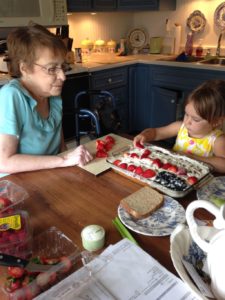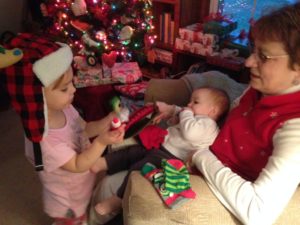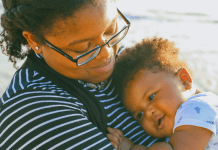This month marks three years since my mother-in-law died in 2014. She had been sick for many years with lupus, and her health began declining quickly over the last two or so years before her passing. The last summer we spent with her, she was in and out of the hospitals and then, finally, hospice.
I can remember distinctly the last visit we had with my mother-in-law at her home. She had always been an avid baker, and one of her favorite things in the world was to bake with her grandchildren. She was very sick, but she would not let me help her make an American Flag Poke Cake with my daughter, Olivia, for the Fourth of July. Looking back now, I realize that she knew that might be her last chance. She was right.

It’s Complicated
Like most things, becoming a parent makes everything more complicated than before parenthood. In past seasons of my life, grief was my own to process through. This time, though, my husband and I were challenged to continue parenting, through the grief.
Throughout my life, I have had many examples of moms and dads dealing with their own pain, while also dealing with the pain of their children. I have seen good examples, as well as bad ones. I have decided that there is one important key for parents of young children when parenting through grief.

Stay Present Through the Grief
I am not sure how good of job I have done with this, but I have tried my best to stay present to both my own pain and my children in the process. Kids have a wide range of emotions when dealing with loss, and our kids were no different. At ages four and one, the kids were understandably most disturbed by the upset in schedules and predictability. Somehow, though, my husband and I had to figure out to balance our own sadness with attending to their emotions about their experience, as well as their basic daily needs.
It’s really hard to attend to routine needs when your life has just been turned upside down! We had to keep doing that, though. I think it really highlighted for me how unselfish parenting demands us to be. My husband, especially, would otherwise have every right to demand the world center around him and his pain. Yet, we had to choose to continue attending to needs outside of our own.
Being Honest Is the Best Policy
While parents need to still parent through pain and grief, that is not the same thing as hiding or ignoring pain. We had to learn to express our own sadness, anger, and fatigue to not just each other, but to our kids, too. It is important for our children to see real examples of adults handling the hard things in life. My husband and I didn’t want our kids to become the burden bearers. However, we needed to be open and honest with how we handle our grief and move through it.
I also think that part of that honesty is being able to ask for help. Friends and family were so gracious during that season to support us with meals, babysitting, and even running errands. My kids got to see not just their parents experiencing grief, but also the loving support of a community. They saw and felt not just humanness in their parents, but the power of relationships to aid in the healing. They experienced what it is like to not be alone, even in darkness.













